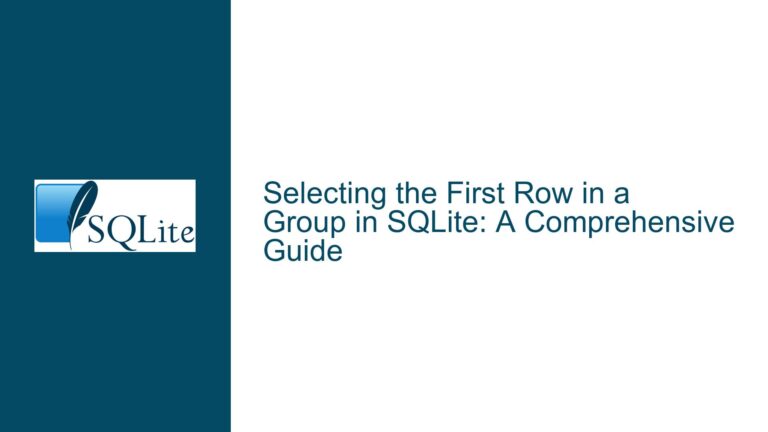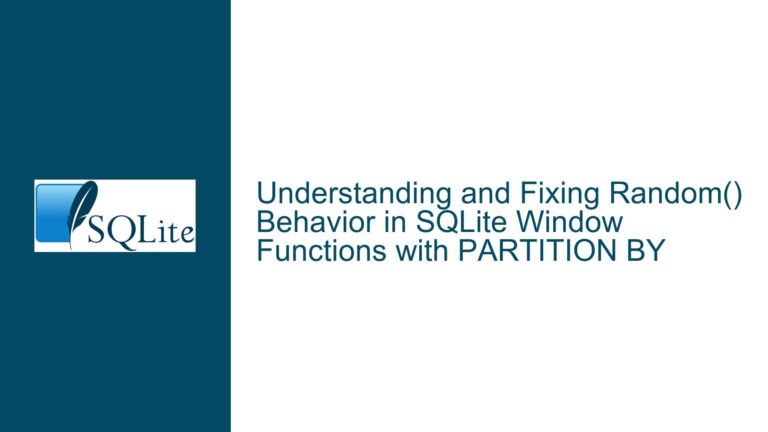Inconsistent Query Results Due to RTREE Floating-Point Precision Limitations
RTREE Floating-Point Precision and Query Result Discrepancies
The core issue revolves around the inconsistent behavior of SQLite queries involving the RTREE virtual table when comparing floating-point numbers. Specifically, the problem manifests when a query involving an RTREE table returns different results depending on whether the comparison is performed by the RTREE virtual table itself or by SQLite’s core engine. This discrepancy arises due to the inherent limitations of floating-point precision in the RTREE implementation, which uses 32-bit IEEE floating-point numbers internally, whereas SQLite’s core engine uses 64-bit floating-point numbers for comparisons.
The RTREE virtual table is designed for spatial indexing and is optimized for range queries, such as finding all objects within a bounding box. However, its internal representation of floating-point numbers is limited to 32-bit precision, which can lead to unexpected behavior when performing equality comparisons on large floating-point numbers. For example, the numbers 9223372036854775807.8 and 9223372036854775807.0 are considered equal when compared as 32-bit floats but are distinct when compared as 64-bit floats. This difference in precision can cause queries to return inconsistent results depending on how the query is structured and which component of SQLite performs the comparison.
The issue is particularly evident in queries that involve both RTREE and non-RTREE tables. When the RTREE virtual table handles the comparison, it uses its 32-bit floating-point representation, which may treat two numbers as equal even if they are not. However, when SQLite’s core engine handles the comparison, it uses 64-bit floating-point numbers, which can distinguish between the two values. This discrepancy can lead to situations where a query returns a row in one context but not in another, even though the underlying data and query logic appear to be the same.
Floating-Point Precision and RTREE’s Internal Representation
The root cause of the issue lies in the way floating-point numbers are represented and compared within the RTREE virtual table. RTREE uses 32-bit IEEE floating-point numbers for its internal calculations, which have a limited precision compared to the 64-bit floating-point numbers used by SQLite’s core engine. This difference in precision can lead to unexpected behavior when performing equality comparisons on large floating-point numbers.
For example, consider the following two numbers: 9223372036854775807.8 and 9223372036854775807.0. When represented as 32-bit floating-point numbers, these two values are considered equal because the precision of 32-bit floats is insufficient to distinguish between them. However, when represented as 64-bit floating-point numbers, the two values are distinct, and a comparison between them will correctly identify them as different.
This difference in precision becomes problematic when performing queries that involve both RTREE and non-RTREE tables. If the RTREE virtual table is responsible for performing the comparison, it will use its 32-bit floating-point representation, which may treat the two numbers as equal. However, if SQLite’s core engine performs the comparison, it will use 64-bit floating-point numbers, which can correctly distinguish between the two values. This discrepancy can lead to inconsistent query results, depending on which component of SQLite handles the comparison.
The issue is further compounded by the fact that the RTREE virtual table is optimized for range queries, where exact equality comparisons are less common. As a result, the RTREE implementation does not prioritize precise equality comparisons, and the use of 32-bit floating-point numbers is generally sufficient for its intended use case. However, when exact equality comparisons are required, the limitations of 32-bit floating-point precision can lead to unexpected behavior.
Mitigating Floating-Point Precision Issues in RTREE Queries
To address the issue of inconsistent query results due to floating-point precision limitations in the RTREE virtual table, several strategies can be employed. These strategies aim to either avoid the precision limitations altogether or work around them in a way that ensures consistent query results.
Avoid Exact Equality Comparisons on Floating-Point Numbers
One of the most effective ways to mitigate the issue is to avoid performing exact equality comparisons on floating-point numbers, especially when dealing with large values. Floating-point numbers are inherently approximate, and exact equality comparisons are rarely meaningful in practice. Instead, consider using range-based comparisons or tolerance thresholds to determine whether two floating-point numbers are "close enough" to be considered equal.
For example, instead of writing a query like:
SELECT * FROM t0, t1 WHERE t0.c2 = t1.c0;
you could use a range-based comparison:
SELECT * FROM t0, t1 WHERE ABS(t0.c2 - t1.c0) < 1e-6;
This approach ensures that the comparison is performed with a tolerance threshold, which can account for the limited precision of floating-point numbers and produce more consistent results.
Use Explicit Type Casting to Ensure Consistent Comparisons
Another strategy is to use explicit type casting to ensure that comparisons are performed using the same precision. By casting floating-point numbers to a specific type before performing the comparison, you can ensure that the comparison is consistent regardless of which component of SQLite handles it.
For example, you could cast the floating-point numbers to integers before performing the comparison:
SELECT * FROM t0, t1 WHERE CAST(t0.c2 AS INTEGER) = CAST(t1.c0 AS INTEGER);
This approach ensures that the comparison is performed using integer arithmetic, which is not subject to the same precision limitations as floating-point arithmetic. However, this approach may not be suitable for all use cases, especially if the floating-point numbers have fractional components that need to be preserved.
Restructure Queries to Avoid OR Conditions
In some cases, the issue can be mitigated by restructuring the query to avoid OR conditions that prevent the RTREE virtual table from performing the comparison. For example, consider the following query:
SELECT * FROM t0, t1 WHERE t0.c2 = t1.c0 OR t0.c1;
This query includes an OR condition that prevents the RTREE virtual table from handling the comparison, forcing SQLite’s core engine to perform the comparison using 64-bit floating-point numbers. To avoid this, you could split the query into two separate queries:
SELECT * FROM t0, t1 WHERE t0.c2 = t1.c0;
SELECT * FROM t0, t1 WHERE t0.c1;
By splitting the query, you ensure that the RTREE virtual table can handle the comparison in the first query, while the second query is handled by SQLite’s core engine. This approach can help ensure that the results are consistent with the intended behavior.
Use Alternative Data Types for Exact Comparisons
If exact equality comparisons are essential for your use case, consider using alternative data types that are not subject to the same precision limitations as floating-point numbers. For example, you could use integers or fixed-point decimal numbers for values that require exact comparisons. This approach ensures that the comparisons are performed with the necessary precision, avoiding the issues associated with floating-point arithmetic.
For example, instead of storing a large floating-point number like 9223372036854775807.8 in an RTREE table, you could store it as an integer or a fixed-point decimal number:
CREATE VIRTUAL TABLE t0 USING rtree(c0 INTEGER, c1 INTEGER, c2 INTEGER);
INSERT INTO t0(c0, c1, c2) VALUES(0, 0, 9223372036854775807);
This approach ensures that the values are stored and compared with the necessary precision, avoiding the issues associated with floating-point arithmetic.
Conclusion
The issue of inconsistent query results due to floating-point precision limitations in the RTREE virtual table is a subtle but important consideration when working with SQLite. By understanding the limitations of floating-point arithmetic and employing strategies to mitigate these issues, you can ensure that your queries produce consistent and accurate results. Whether through avoiding exact equality comparisons, using explicit type casting, restructuring queries, or using alternative data types, there are several approaches to address this issue and ensure the reliability of your SQLite-based applications.






